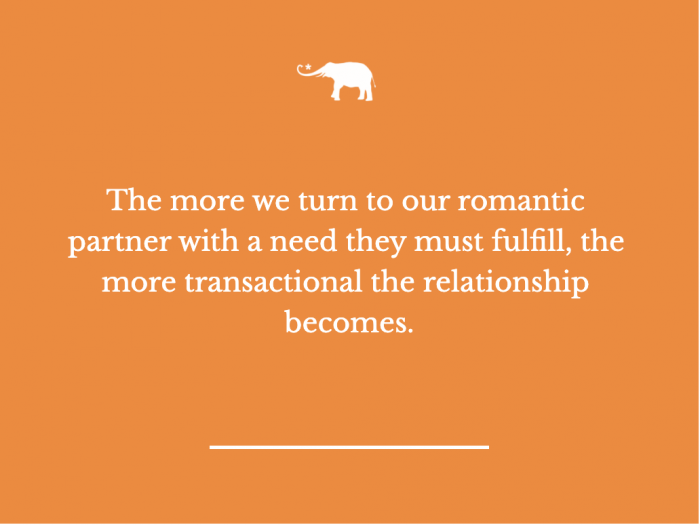We are sold on the notion that romantic love is the highest form of human emotion—the gold at the end of rainbow, the bliss that takes us out of our daily monotony, the drug to beat all drugs.
Our current social structures are organized around the idea that love is the end point we are all searching for: dating, marriage, affairs. We live with our romantic partners (why not our best friends or siblings?) because romantic love is the only feeling worthy of such exalted status.
But I’m here to tell you that romantic love doesn’t exist.
Biology has pulled off one of the greatest long cons, with human beings as the marks. An open spigot of dopamine, norepinephrine, and adrenaline courses through our veins when we meet someone we like, who likes us, who we are attracted to, who is attracted to us, who we can share deep, intimate things with, and who shares deep, intimate things with us. This is biology, blinding us with the bling, distracting us from the true intent: to make us want to jump this person’s bones over and over again (and hopefully, in the process, make babies). Crazy, feel-good hormones are to blame for the initial rush of “feelings,” which aren’t really feelings at all.
And, as many of us unfortunately have experienced firsthand, when the bubble of crazy, feel-good hormones bursts, the reality has little to do with love. Our love-interest criticizes how we chew, stops returning our texts with the same promptness, and suddenly notices how loudly we snore. We move from blind approval to critical observation. This trajectory is often somewhere between four to six months from madly in love to sobering truth.
So, does real love come after that?
Love, as we think of it, means unconditional acceptance, support, and positive regard; a desire to give to someone else before thinking of ourselves; a desire to make someone happy, to lighten their load, to understand their nuanced self. It, by definition, is lasting and unwavering.
It makes sense as a parent: my child could confess murder to me and it wouldn’t disrupt my feelings in any way. He could not call me for or see me for years, and my delight wouldn’t change the moment I saw him again. He could spew the most barbed, ugly insults my way, and the next day, I would hug him in a show of forgiveness. His actions don’t matter; my feelings aren’t dependent on them.
Could any of us say that about our romantic partners—that their actions have no bearing on our feelings?
If your spouse cheated on you with the neighbor, consistently played video games while you cleaned up and put the kids to bed, or stopped having sex with you, don’t feelings change? And shouldn’t they? No one wants to stay with a sub-par or abusive partner. We shouldn’t feel warm and tender toward the selfish adult living with us just because we once found them charming and attractive. How a person treats us affects our feelings. Whether a person fulfills our needs or not affects our feelings. Therefore, what we feel isn’t love.
If our regard for our partner is dependent on a fulfillment of needs, then the feelings are transactional. Love is the opposite of that. There is nothing my son needs to do to get my love, no exchange for what I freely offer him. Us parents, we are The Giving Tree, happy to be cut down to a stump if it makes our child smile. There is never any repayment required.
But romantic feelings don’t follow the same model. The more we turn to our romantic partner with a need they must fulfill, the more transactional the relationship becomes. If you have regular sex with me, I’m happy and invested. If you listen to the details of my day after work, I feel supported and can be open with you. If you put the kids to bed so I can get a break, I can be relaxed and have energy for you. The reverse is also true: if you don’t give me what I need or expect, we fight or become distant or get resentful.
We want to be able to demand things from our partner, just like we did with our own parents who may or may not have been unconditional. We want our partner’s “love” for us to supersede their own issues, their tiredness, their dislike for the task, and just do it. We seek proof of their feelings for us over and over again, and if they don’t meet our expectations, we conclude that their feelings are lacking. We step away from love and enter into a symbiotic partnership, characterized by a series of daily negotiations.
How do long-term couples overcome this business transaction mentality?
The answer is something simple: friendship, perhaps mixed with admiration, continued sexual attraction, and commitment.
What we should want, in any long-term partnership, is great friendship: the kind that can sustain the ugly trenches of child-rearing, job losses, distance, and stress. We can enjoy the time and gifts our friends bring into our lives, without any specific expectations for what they must give us in return. The best romantic relationships model this, lowering expectations and embracing whatever it is the other person brings to the table. And paradoxically, the more we let go of expectations, the more effort our partner may put into meeting them. People like to choose to do nice, helpful things, not to be obligated to do them. And if we can get back to giving without expectation, we may just take a step closer to love.







Read 5 comments and reply